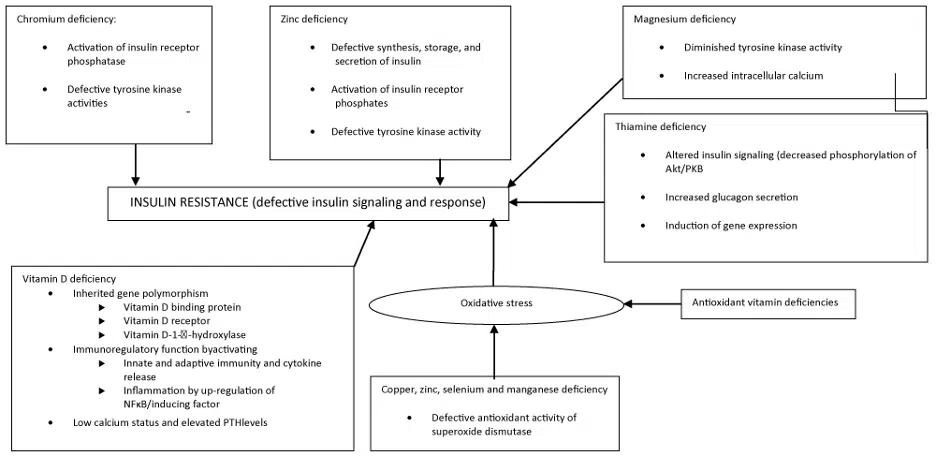By 2030, one out of nine people will have diabetes. Scientific evidence continues to demonstrate the link between micronutrient deficiencies and the occurrence of diabetes, as well as other chronic diseases, such as high blood pressure, obesity, dyslipidemia, and cancer. Improved access to healthy, micronutrient-rich diets and quality nutrition education are necessary to improve health outcomes. The USAID-funded Ranfòse Abitid Nitrisyon pou Fè Ogmante Sante (RANFOSE) program joined health professionals, patients, governments, civil society, and the public to shine a light on diabetes and celebrate World Diabetes Day on November 14.
Diabetes is a chronic disease that occurs when there is too high of a concentration of glucose in the blood. Diabetic patients face serious and life-threatening complications such as heart attacks, stroke, lower limb amputation, kidney failure, and vision loss.
Insulin, the hormone that regulates the movement of sugar into cells, plays an important role in managing the blood’s glucose levels. Insulin resistance is when the body’s system for responding to insulin malfunctions and cells cannot easily take up glucose from the blood. Over time, chronic insulin resistance can lead to prediabetes and, eventually, Type 2 diabetes. Emerging evidence indicates that micronutrient deficiency may play a significant role in the development and progression of diabetes through the induction of insulin resistance.
Micronutrients are vitamins and minerals that are necessary for the body in small quantities to enhance physiological and biochemical processes. They help to trigger thousands of chemical reactions necessary for good health. Deficiencies in micronutrients associated with insulin production or response can impact important physiological and biochemical processes and lead to metabolic and biochemical derangement related to insulin resistance, including oxidative stress; dysfunction of the pancreatic ß cells; defective insulin signaling mechanism; elevated activity of the kinase protein; loss of sensitivity of the immune system; and inflammation.
In addition to the link between micronutrient deficiencies and insulin resistance, diabetes patients have increased requirements for nutrients due to decreased absorption and higher losses, oxidative stress, and inflammation of the blood vessels. In other words, because those with diabetes have a higher requirement for micronutrients, they are at an elevated risk for micronutrient deficiencies and their corresponding complications.
Insulin Resistance and Micronutrient Deficiency: Zinc, Folate, Vitamin B, and Vitamin A
Figure 2 The link between different micronutrient deficiencies and IR. NF: nuclear factor- B; PKB, protein kinase B; PTH, parathyroid hormone. https://www.heighpubs.org/hfns/afns-aid1013.php
Zinc plays an essential role in cell maintenance. Zinc deficiencies are associated with cancer, autoimmune diseases, degenerative diseases, and diabetes. One of the most important roles of this micronutrient is in the synthesis, secretion, and action of insulin. Several studies have shown that zinc acts as a second messenger in the control of insulin signals and glucose synthesis. It also stimulates the absorption of glucose by cells, thus reducing blood sugar. A person with diabetes has an elevated risk of developing zinc deficiency due to higher rates of zinc elimination from the body coupled with decreased absorption. This deficiency can accelerate the onset of vascular atherosclerosis and, subsequently, coronary heart disease. In addition, zinc deficiency can increase the risk of folic acid deficiency.
Folate, also known as folic acid, is a vitamin whose benefits are well-known for pregnant and lactating women. Indeed, folic acid is essential for newborn development. Folate deficiency in the mother can lead to hyperinsulinemia (elevated insulin levels in the blood) as well as a reduction in the adiponectin/leptin ratio, a marker of insulin sensitivity. Studies have shown an inverse relationship between blood folate levels and markers of insulin resistance. Furthermore, folate deficiency is a risk factor for strokes, heart attacks, dementia, and macular (eye membrane) degeneration that can lead to blindness among those affected by diabetes.
Vitamins in the B group, including vitamin B1, provide many important benefits to the human body. In addition to supporting the body’s nerve functions, they are critical cofactors for the enzymes involved in glucose and amino acid metabolism, particularly pyruvate dehydrogenase, dehydrogenase α ketoglutarate, and keto acid decarboxylase, which regulate glycolysis, citric acid, and pentose phosphatase pathways. Vitamin B3 supports the regeneration of ß cells of the pancreas and inhibits their destruction. Vitamin B is exceedingly important for diabetic patients. Not only does vitamin B deficiency increase the risk of vascular complications such as diabetic neuropathies, but there is also an increased need for efficient cycling of B vitamins by the kidneys if the diabetes is not well controlled.
Vitamin A, like Vitamin B, plays many important roles in the body. In addition to supporting healthy vision, Vitamin A is also involved in immunity and embryo formation. Vitamin A facilitates the development of the pancreas and ß cells that produce insulin. Recent studies have shown that vitamin A regulates several activities involved in the occurrence of metabolic diseases (i.e. obesity, dyslipidemia, cardiovascular disease, and diabetes). Vitamin A deficiencies lead to significant histomorphological and biochemical changes in the pancreas such as the death of ß cells, decrease in pancreatic islets, and proliferation of cells that produce glucagon, a hormone responsible for increasing blood sugar.
Diabetes can be prevented or better controlled through improved micronutrients consumption and regular exercise
Diabetes prevention and management require a healthy and balanced diet and an active lifestyle. In fact, a balanced diet rich in fruits, vegetables, fatty fish, dairy products, and nuts (peanuts, almonds, cashews, pistachio, walnut, etc.) is a pillar of care for the diabetic patient. However, at a time when Haiti is facing very high food insecurity that affects nearly 4.7 million people, at a time when the supply of fruit and vegetables is proving difficult because of gasoline shortages and road closures, fortified products that remain available in the market can be a good alternative to help combat micronutrient deficiencies and therefore help prevent and better manage diabetes. RANFOSE supports this end by working with the private sector to make sure that fortified oil, flour, and salt products not only remain available in the market, but are also fortified in conformity with the Haitian Ministry of Health standards.
This article is made possible by the generous support of the United States Agency for International Development (USAID). The contents are the responsibility of Partners of the Americas and do not necessarily reflect the views of USAID or the United States Government.





